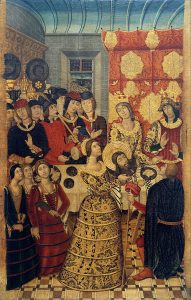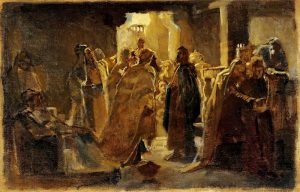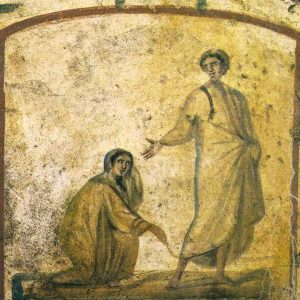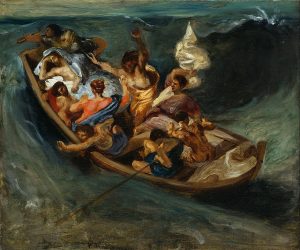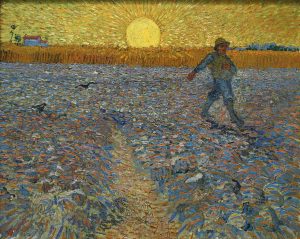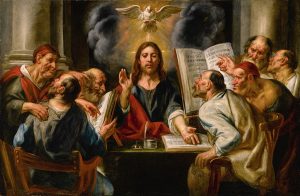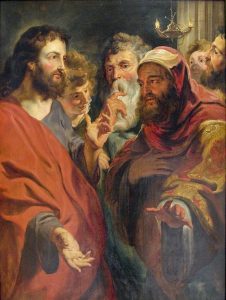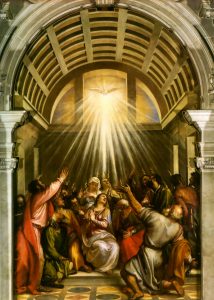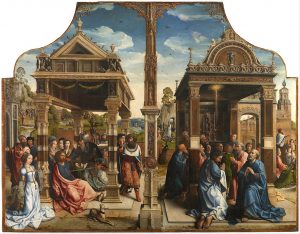Thoughts on Sunday’s Lessons for July 18, 2021
First Reading (Track One): 2 Samuel 7:1-14a
Our Track One first readings will continue following the life and acts of King David through mid-August, when we will turn to David’s son, Solomon.
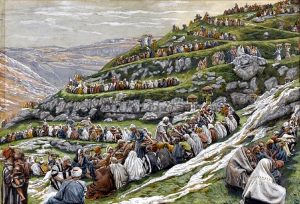
The Miracle of the Loaves and Fishes (1886-1896). Opaque watercolor over graphite on gray wove paper by James Tissot (1836-1902). The Brooklyn Museum. (Click image to enlarge.)
In Sunday’s reading David, having consolidated Israel and Judah under his rule, becomes concerned about the people’s long-standing custom of keeping the Ark of the Covenant in a tent. This practice, he believes, is not sufficient to reflect the greatness of God. David decides to build a great temple, but God, speaking through the Prophet Nathan, dismisses this idea. God tells Nathan that God’s home is with the House of David, the dynasty of God’s people. It will later fall to Solomon to build the first temple.
First Reading (Track Two): Jeremiah 23:1-6
The image of a shepherd as metaphor for a caring leader who protects the flock recurs in several of our Track Two readings. First we hear the prophet Jeremiah speaking fierce truth to the power of Babylon, which had destroyed Jerusalem and the temple and was holding many of the people in exile. God is going to round up the remnant of his scattered flock and bring them home like a shepherd with his flock, the prophet declares, and the oppressors will be punished for their evil. Soon, the prophet adds, God will restore the glory of the lost kingdom, raising up a mighty new king like David.
Psalm (Track One): Psalm 89:20-37
Our Track One Psalm portion follows the first reading with a celebration of God’s covenant with David and his descendants: God made this royal family to endure forever. David’s line will last even through the devastation of war and the pain of exile, the Psalmist sings. David’s line will remain even through God’s wrath when the nation breaks its covenant with God. The people’s iniquities might bring punishment, the rod and the lash, but their actions will never take away God’s love nor prevent the rise of a new David, Messiah and King.
Psalm (Track Two): Psalm 23
Our Lectionary rarely goes long without repeating the beloved 23rd Psalm. We come back to it five times in the three-year cycle of readings, allowing us to rest in the glow of its assurance that God’s goodness and mercy are always with us. If you’re feeling lost or uneasy, consider reading the 23rd Psalm in prayer: Sit quietly. Say the verses once or twice. Breathe deeply and relax. Close your eyes, and try to feel the comforting presence of the Shepherd. Stay with it silently, and be thankful for God’s restoring grace.
Second Reading: Ephesians 2:11-22
The author of the letter to the Ephesians seeks to assure formerly Gentile Christians in this small community that they are fully invested in the community, completely united with their Jewish Christian sisters and brothers without any need to follow Jewish law. All have become one through Christ Jesus, the cornerstone, who brings near even those who were once far away. At the time of this writing, late in the first century after the fall of the Temple, Jewish Christianity and rabbinic Judaism were splitting apart. The early church was actively seeking to bring in Gentile converts, and it was important to emphasize the truth that all had become one in Christ.
Gospel: Mark 6:30-34, 53-56
In the Gospel for the Sunday before last, we heard Jesus sending his disciples out in pairs to heal the sick, cast out demons, and teach the good news. Now they’ve returned home, eager to talk about their mission. Perhaps they’re worn out, too, as Jesus invites them go in the boat to a quiet place to rest. But the crowds following Jesus are too eager to wait, so they follow like a herd of sheep, and Jesus feels a shepherd’s compassion for them. Later, after the Lectionary skips over the feeding of the 5,000, Jesus and the apostles cross over the water and land at Gennesaret, where another large flock comes running to see Jesus. Of course this loving shepherd willingly touches and heals all who come.

